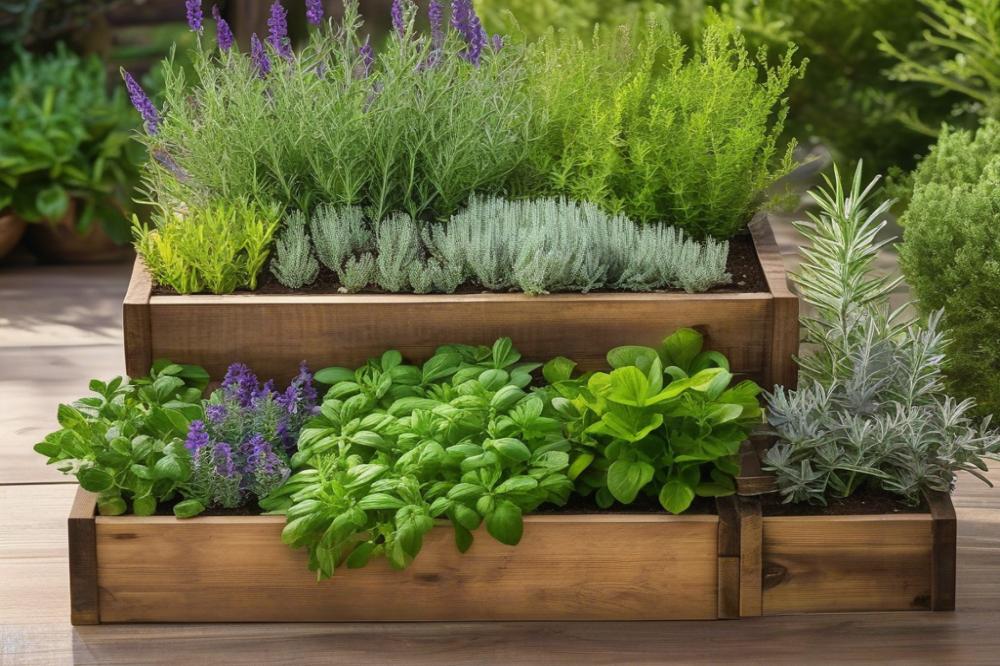Introduction
Mediterranean herbs play a vital role in both cooking and gardening. They elevate flavors in dishes, adding depth and brightness. Cooked foods taste better when seasoned with fresh herbs like basil, rosemary, and thyme. Many recipes across different cuisines rely heavily on these delightful plants. Their aromas can transform an ordinary meal into something truly special.
Growing these plants can be rewarding for anyone interested in herb gardening. These plants thrive in a Mediterranean climate, which is characterized by hot, dry summers and mild winters. Ideal conditions are required for these herbs to flourish. Planting herbs in well-drained soil will promote healthy growth. Basic gardening tips, such as proper spacing and watering, will help achieve success.
Different herb varieties offer diverse flavors and fragrances. Organic gardening techniques can enhance the growing experience. Many gardeners prefer to avoid synthetic pesticides, opting for natural methods instead. Herb care includes regular pruning and harvesting to encourage bushiness and new growth. Understanding the best time for herb harvesting ensures maximum flavor is attained.
These practices allow individuals to enjoy homegrown ingredients year-round. Some may find that growing their herbs provides a sense of accomplishment and connection to nature. Others appreciate the health benefits of fresh herbs. Whatever the reason, the journey of cultivating them is both educational and fulfilling.
Understanding Mediterranean herbs
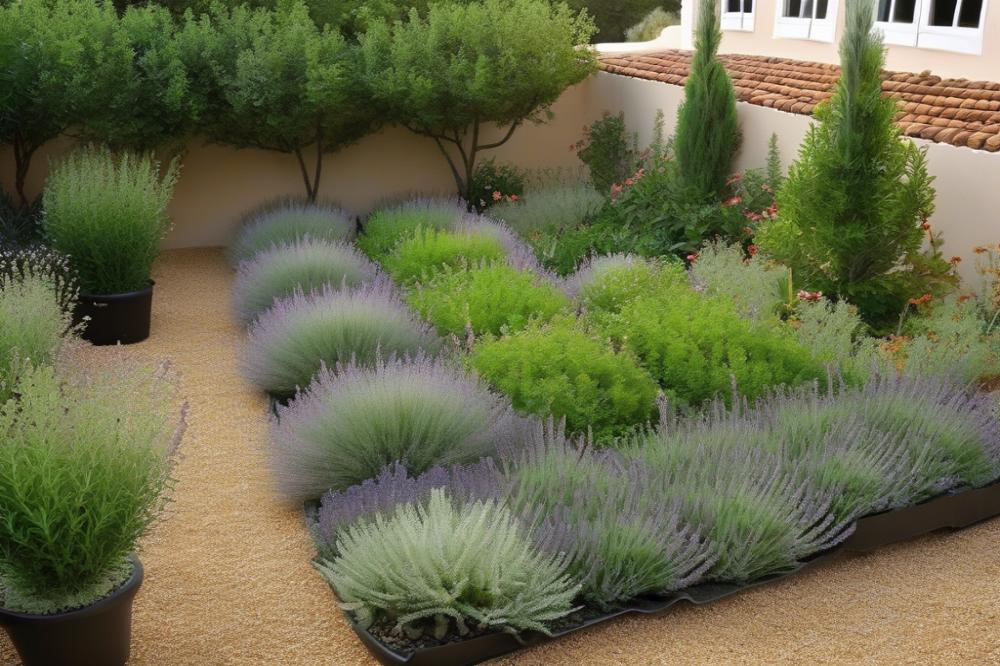

Mediterranean herbs are plants that thrive in regions characterized by warm, dry summers and mild, wet winters. These herbs often possess a robust aroma and strong flavors, making them popular in kitchens around the world. Many grow well in gardens, especially under specific conditions similar to the Mediterranean climate. Their resilience makes them suitable for organic gardening practices.
Several herb varieties stand out in this category. Rosemary, known for its needle-like leaves and pine-like scent, adds depth to roasted dishes. Thyme, with tiny leaves and a subtle earthy taste, enhances sauces and meats beautifully. Basil, a favorite in Italian cuisine, offers a sweet and slightly peppery flavor, perfect for pesto and salads. Oregano, robust and slightly bitter, is a staple in pizza and marinades. Each of these herbs can elevate a simple dish into something extraordinary.
Incorporating these culinary herbs in cooking provides many advantages. They not only enhance flavor but also bring various health benefits. Herbs contain antioxidants, which help protect the body from damage. Adding fresh herbs can reduce the need for excess salt and fat in dishes. Using them not only improves taste but also encourages a healthier lifestyle.
When it comes to gardening tips, proper herb care is essential. Start with good soil and ensure adequate drainage. While planting herbs, consider their sunlight needs. Many of these plants prefer full sun exposure, which can boost their growth. Regular watering is vital, but overwatering can lead to root rot. Through effective herb harvesting techniques, you can enjoy fresh flavors throughout the growing season. Trim herbs often to encourage new growth, and always harvest them before they flower for the best taste.
These herbs not only enrich our meals but also connect us to the diverse cultures of the Mediterranean. Whether you are an experienced gardener or just starting with planting herbs, embracing these flavors can be a delightful journey. With the right approach, you can successfully cultivate these aromatic plants in your own backyard.
Optimal Conditions for Growing Mediterranean Herbs
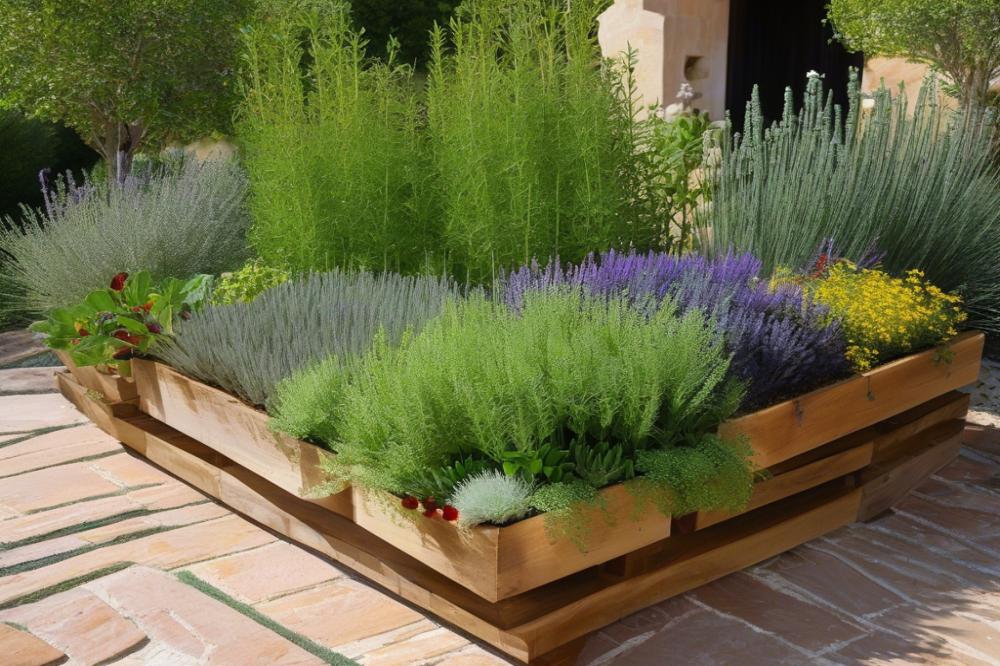

The Mediterranean climate is well-known for its warm, dry summers and mild, wet winters. This specific type of weather plays a vital role in the successful growth of certain herb varieties. Understanding this climate helps in creating the ideal environment for growing edible plants.
Sunlight is crucial for healthy growth. Most culinary herbs thrive in full sun, so aim for a location that receives at least six to eight hours of direct light each day. Adequate exposure to sunlight promotes robust flavors and encourages growth. Without sufficient light, plants may become leggy or weak.
Soil drainage is another important factor. Mediterranean herbs prefer well-draining soil that allows excess water to escape. Dense or waterlogged soil can lead to root rot and other issues. Mixing sand or perlite with regular garden soil can improve drainage. This approach helps mimic the natural conditions found in their native region.
Temperature also affects herb care. These plants are usually tolerant of heat but can struggle in extreme cold. Aim for a spot protected from harsh winds and frost during winter. For gardeners in cooler areas, consider container gardening as a flexible alternative. You can move pots to a sheltered location when needed.
Choosing the right spot for planting herbs will significantly impact their growth. Look for a space near your kitchen for convenience. Freshly picked herbs make the best additions to meals. Keep in mind that different herb varieties may have specific requirements, so research those before planting herbs.
Regular herb harvesting encourages further growth. Remove leaves carefully to improve plant vitality. Using proper gardening techniques will help maintain a healthy crop. An ideal location with the right conditions will yield flavorful herbs, benefiting your culinary adventures.
Gardening Tips for Planting Mediterranean Herbs
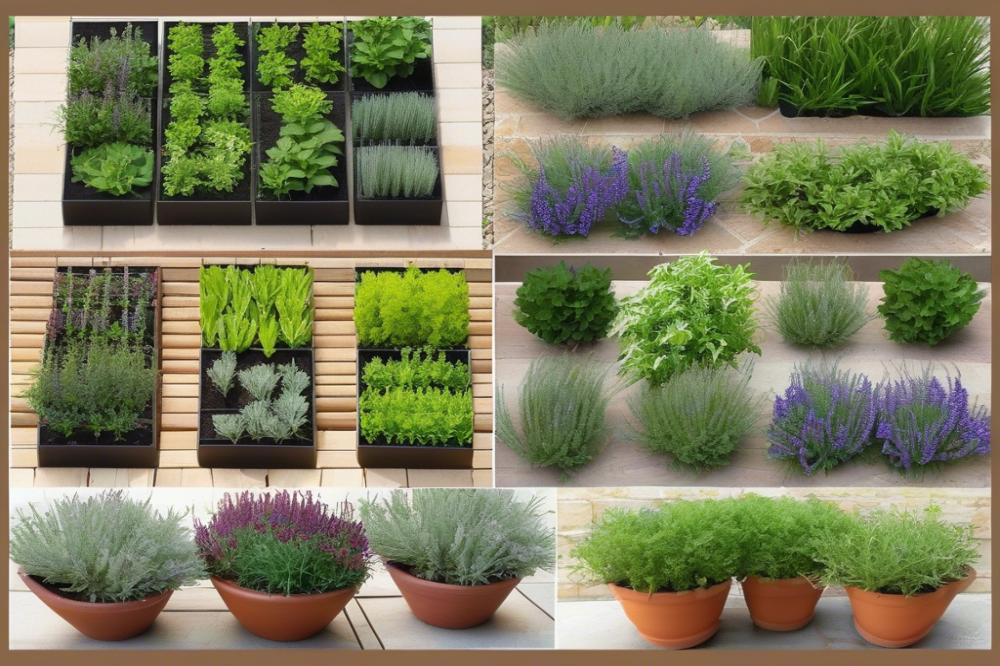

To successfully grow herbs in home gardens, start by understanding their needs. Many thrive in a Mediterranean climate, preferring warm weather and bright sunlight. Choose a location that receives at least six hours of sunlight daily. This plays a crucial role in their growth and flavor.
When planting herbs, select the right varieties for your space. Some popular options include basil, oregano, and rosemary. Each of these culinary herbs has its own requirements. Take some time to learn about them before making final decisions.
Best Practices for Planting Herbs
Prepare your planting area well. Clear any weeds or debris to give new plants the best chance. Testing the soil can help identify its pH level. Most herbs prefer slightly alkaline to neutral soil.
Utilize organic gardening techniques to boost growth. This method encourages biodiversity and soil health. Compost is an excellent addition. It enriches the soil while providing essential nutrients to the plants.
Preparing the Soil and Selecting Containers
The right soil mix is vital for herb care. A combination of potting soil, peat, and perlite works well. This mixture allows for proper drainage, preventing root rot. Always pick containers that have drainage holes; this helps excess water escape.
Choose pots that allow enough space for the roots to spread. Herbs don’t usually require giant containers, but they do need room to grow. When growing multiple herb varieties, make sure to include enough space between them. This practice avoids overcrowding and competition for resources.
Regular herb harvesting encourages bushier growth. Trim back the leaves to promote new shoots. Use fresh leaves in your cooking; the flavor is unmatched. By following these gardening tips, you’ll soon enjoy homegrown flavor in your meals.
Caring for Mediterranean Herbs
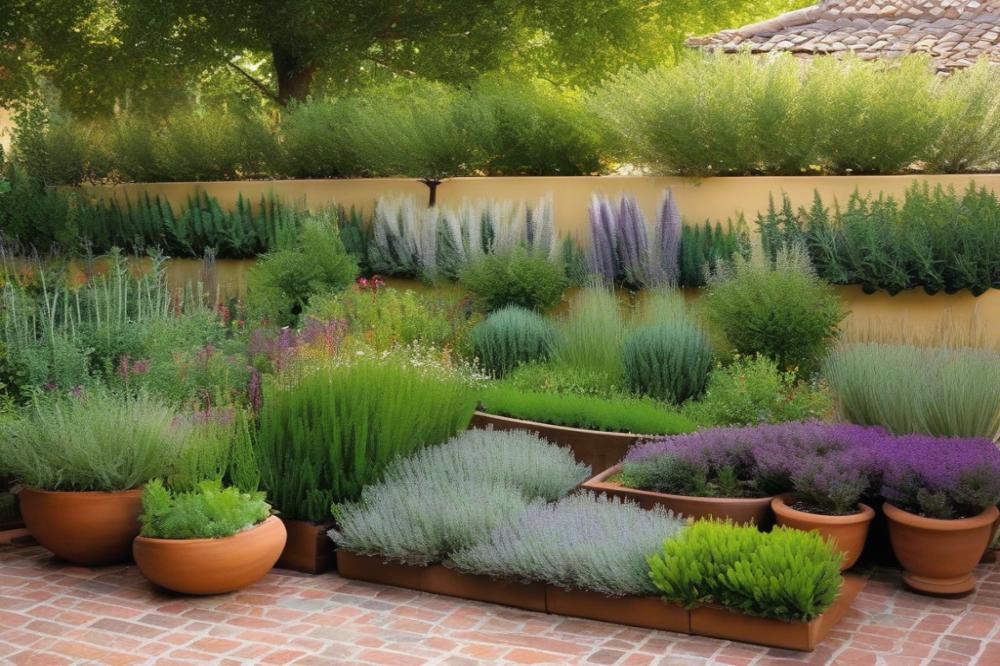

Taking care of herbs involves a few essential techniques. Watering is critical for healthy growth. Mediterranean herbs prefer to dry out slightly between waterings. Overwatering can lead to root rot, so always check the soil moisture first. During dry spells, remember to water more frequently.
Essential Herb Care Techniques
Pruning is another vital task. Regular trimming helps to promote bushy growth and prevents plants from becoming leggy. Start by removing any dead or yellowing leaves. Focus on shaping the plants to your liking; this will keep them looking neat and vibrant. Feeding with organic fertilizers enhances growth. Use compost or a balanced fertilizer during the growing season to nourish your plants.
Identifying Common Pests and Diseases
Be observant in your garden. Aphids, spider mites, and whiteflies often target culinary herbs. Inspect the leaves regularly for signs of these pests. Yellow leaves or wilting stems may indicate diseases like powdery mildew or root rot. Taking quick action can prevent larger problems. Insecticidal soap or neem oil is a safe option for treating these issues.
Sustainable Practices for Maintaining Herb Health
Practicing organic gardening helps support a healthy environment. Avoid synthetic pesticides, which can harm beneficial insects. Crop rotation can also be an effective gardening technique. This approach reduces the likelihood of diseases and keeps nutrients balanced in the soil. Planting herbs native to your area can lead to more resilient varieties. Choosing the right location with ample sunlight is crucial, especially in a Mediterranean climate.
Herb harvesting should be done carefully. Picking leaves and stems encourages more growth. Always use clean scissors or shears. Harvesting in the morning when oils are most concentrated ensures extra flavor in your cooking. Regular care will lead to a rewarding experience in your garden.
Harvesting and Storing Mediterranean Herbs
To grow herbs successfully, harvesting techniques matter greatly. The key is to pick leaves without damaging the plant. This method stimulates new growth and encourages the herb to become bushier. Using clean, sharp scissors or garden shears makes a difference. Trim the stems just above where you see leaves. Doing this helps the plant thrive.
Best Times to Harvest
Different herb varieties have optimal harvesting times. Early morning is often ideal, as plants are full of moisture. For example, rosemary and thyme can be harvested just before they bloom. Basil, on the other hand, flourishes when picked regularly, especially before flowering. It’s essential to monitor each type and learn the right moments for harvesting.
Methods for Drying and Storing Herbs
Proper drying ensures herbs maintain their flavors for future use. Air drying works well for hardy herbs, like oregano and sage. Hang small bundles upside down in a cool, dark place. For more delicate herbs, like parsley or chives, using a dehydrator can be effective. Alternatively, the oven method with low heat is another option. After drying, store them in airtight containers away from light. This helps preserve their taste and aroma for a long time.
While gardening tips can vary greatly, being aware of the need for organic gardening principles goes a long way. Careful harvesting and correct storing of your culinary herbs allows you to enjoy the fruits of your labor long after the season ends. With these effective strategies for herb care, you’ll find that maintaining your garden becomes much more rewarding.
Culinary Uses and Recipes with Mediterranean Herbs
Popular Culinary Herbs and Their Flavor Profiles
Many culinary herbs thrive in a Mediterranean climate. Basil is a favorite, known for its sweet and slightly peppery flavor. Oregano offers a robust and earthy taste, perfect for hearty dishes. Rosemary has a strong, pine-like aroma that enhances roasted meats. Thyme provides a subtle, herbal quality that brightens soups and stews. Parsley gives a fresh, mild taste and is often used as a garnish. These herb varieties can elevate any meal, bringing a burst of flavor that no other ingredient can match.
Simple Recipes Highlighting Mediterranean Herbs
Making a basil pesto is a great way to utilize fresh basil. Just blend basil leaves with garlic, pine nuts, Parmesan cheese, and olive oil. This vibrant sauce pairs wonderfully with pasta. For a quick side dish, roast potatoes with rosemary. Toss the potatoes in olive oil and sprinkle fresh rosemary before baking. Another option is to create a fragrant herb-infused olive oil. Combine thyme, oregano, and garlic in a bottle with olive oil. Use it for dipping bread or drizzling over vegetables.
Pairing Herbs with Different Ingredients for Enhanced Flavors
When planting herbs, think about how they complement other ingredients. Pairing oregano with tomatoes makes for a classic sauce. Use parsley to brighten up rich dishes like stews or grilled meats. Rosemary shines alongside lamb and is also delightful with bread. Consider combining thyme with lemon to add zest to fish. Each herb has its own character, and understanding this can enhance your cooking. Organic gardening methods can help grow these herbs healthy and flavorful.
Having herb care knowledge is essential for frequent use. Herbal harvesting should occur just before the plants bloom to capture peak flavor. When using these herbs, fresh options are often best. Experimenting with different herbs can lead to delightful discoveries in the kitchen. Never overlook the power that these plants hold over taste and aroma.
The Joys of Cultivating Mediterranean Flavors
Growing Mediterranean herbs offers a variety of benefits that go beyond just enhancing your meals. These plants are resilient, often thriving in sunny and dry conditions. Their aromatic leaves can elevate the taste of countless dishes, transforming ordinary recipes into culinary masterpieces. Imagine reaching for fresh basil or rosemary right from your garden when preparing dinner. This convenience can inspire creativity in cooking and bring excitement to every meal.
Starting a personal herb garden is not only rewarding but also incredibly fulfilling. There is something refreshing about nurturing a plant from a tiny seed or cutting to a flourishing source of flavor. Even a small windowsill can become a delightful space for cultivating these aromatic companions. Growing your own provides a unique opportunity to learn about their care, growth patterns, and best uses in cooking.
Gardening can be a peaceful escape from the everyday rush. Tending to plants allows time for reflection and relaxation. The act of planting, watering, and harvesting can connect you to nature in a profound way. It encourages mindfulness and appreciation for the little things. With every snip of the scissors, or pinch of a leaf, you engage in an intimate relationship with your food.
Consider this: each herb you cultivate contributes not just flavor but also fresh aromas and natural beauty to your space. Cooking with herbs that you grow deepens the connection between the garden and your kitchen. The joy of enjoying a meal that showcases your hard work and creativity is unmatched. So, whether you are a seasoned gardener or just starting, this is the perfect time to explore the world of culinary herbs. Dive into this rewarding journey, and let your taste buds enjoy the bountiful gifts from your little garden.

